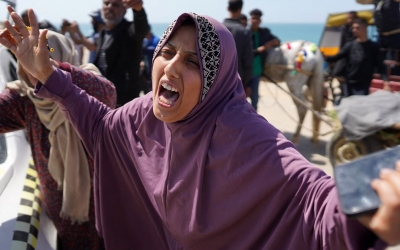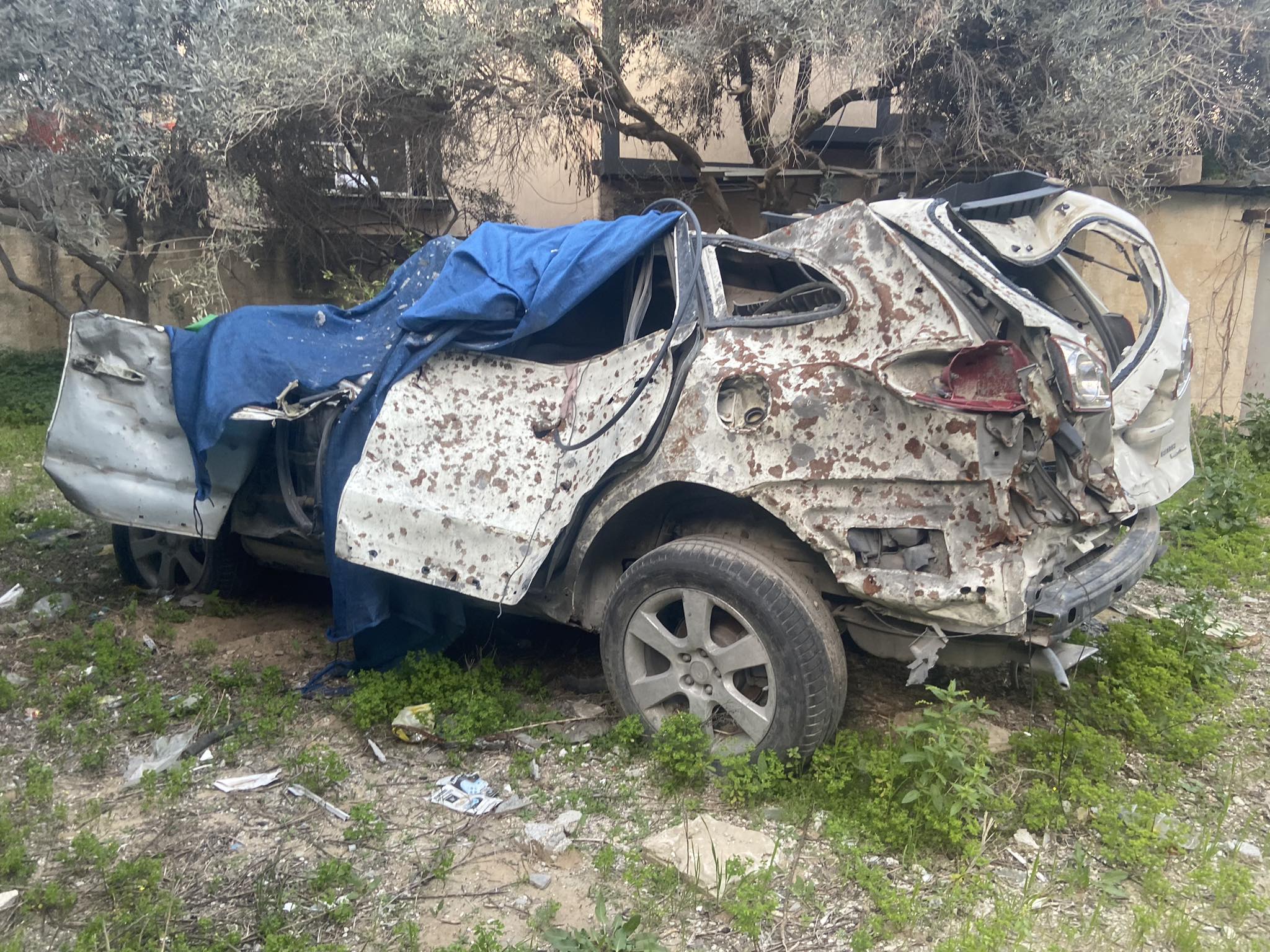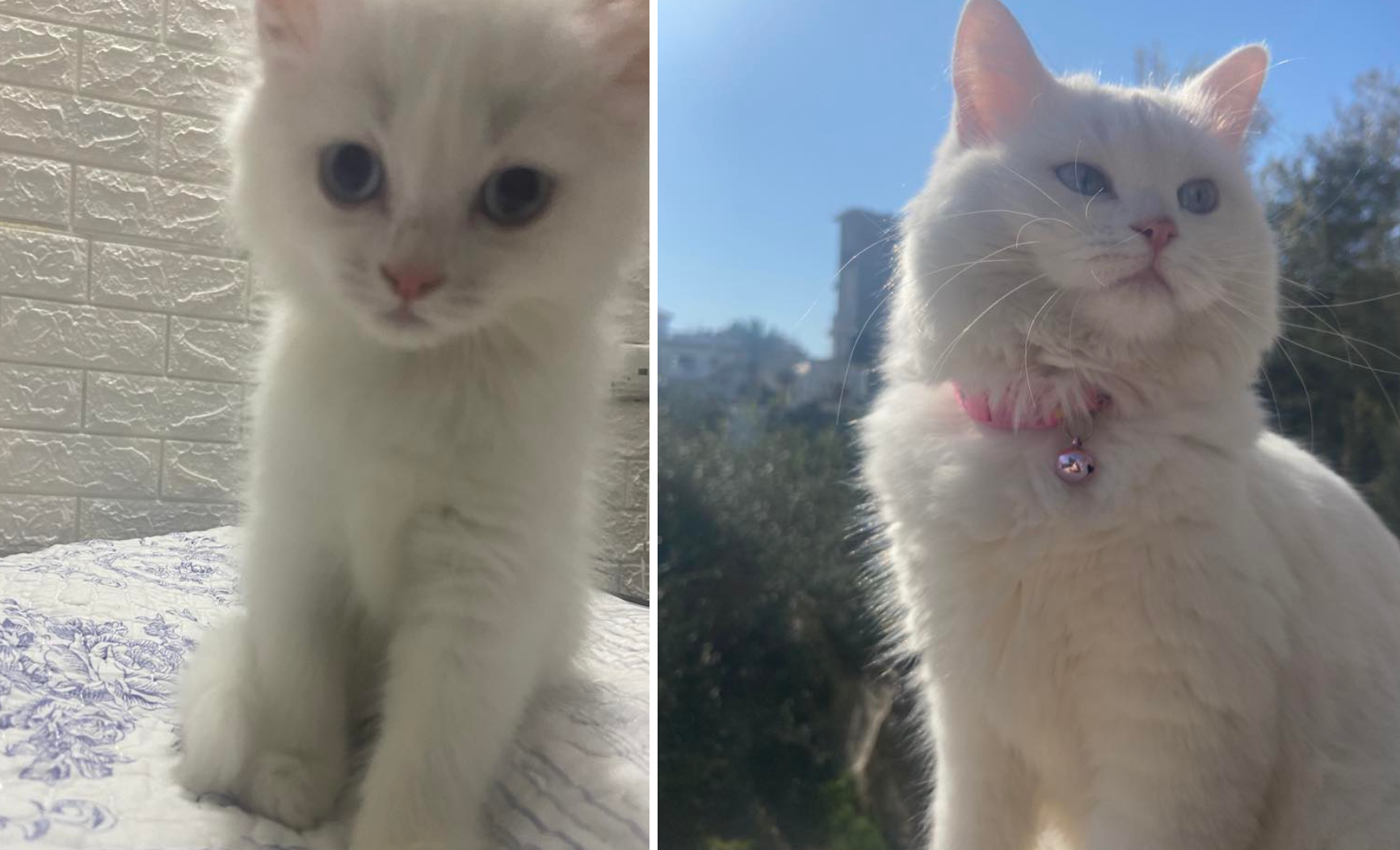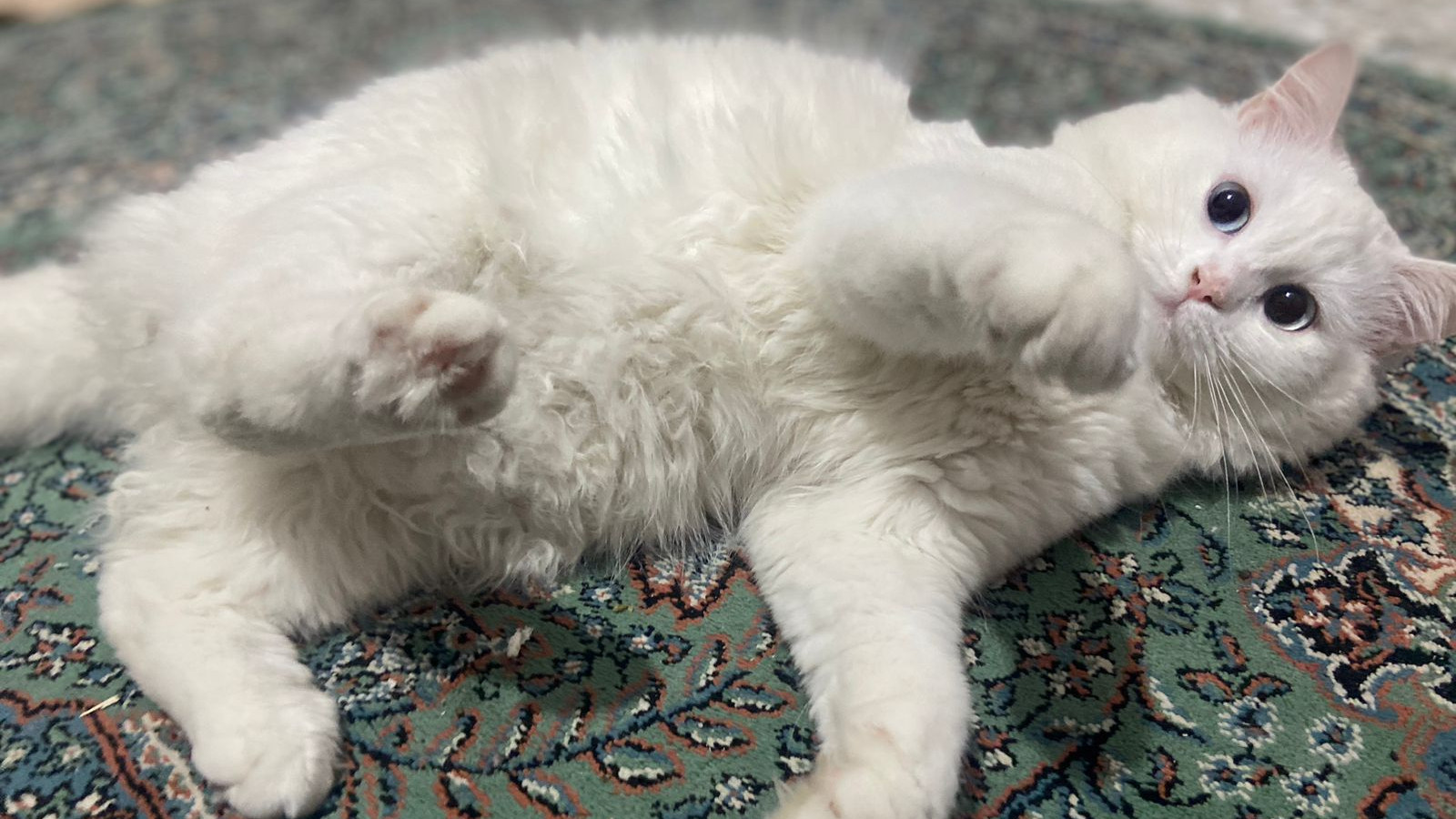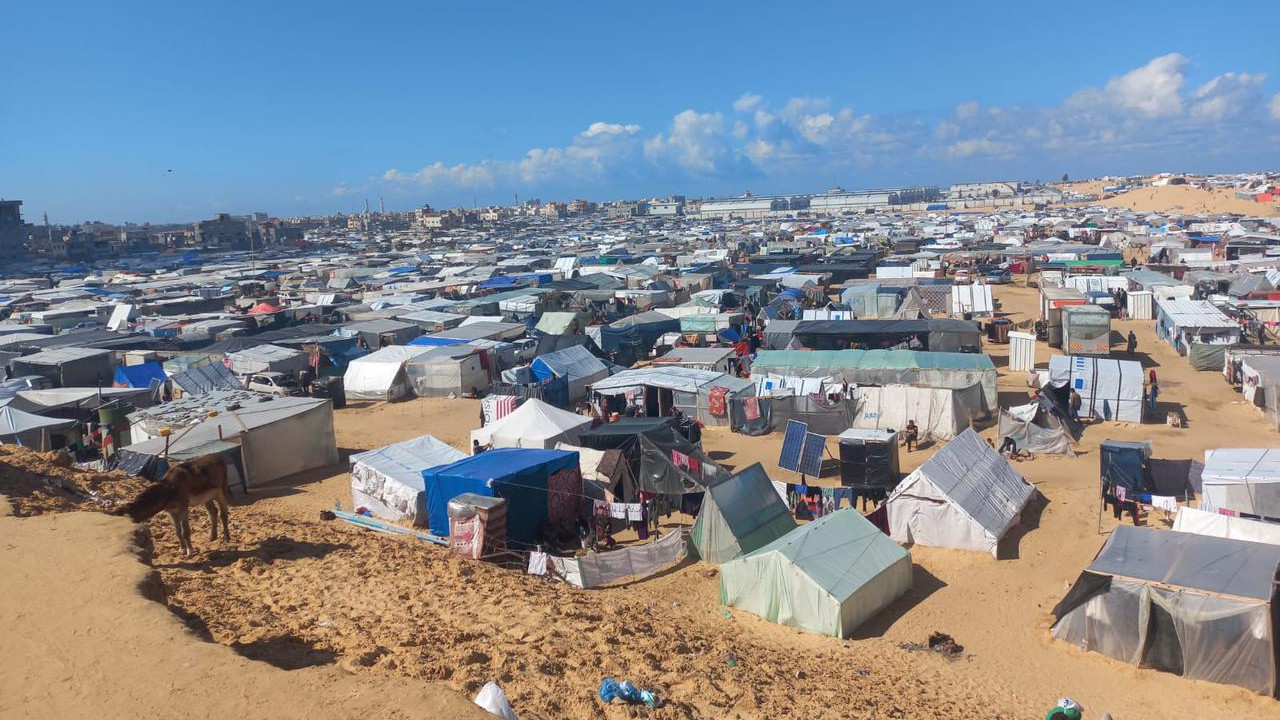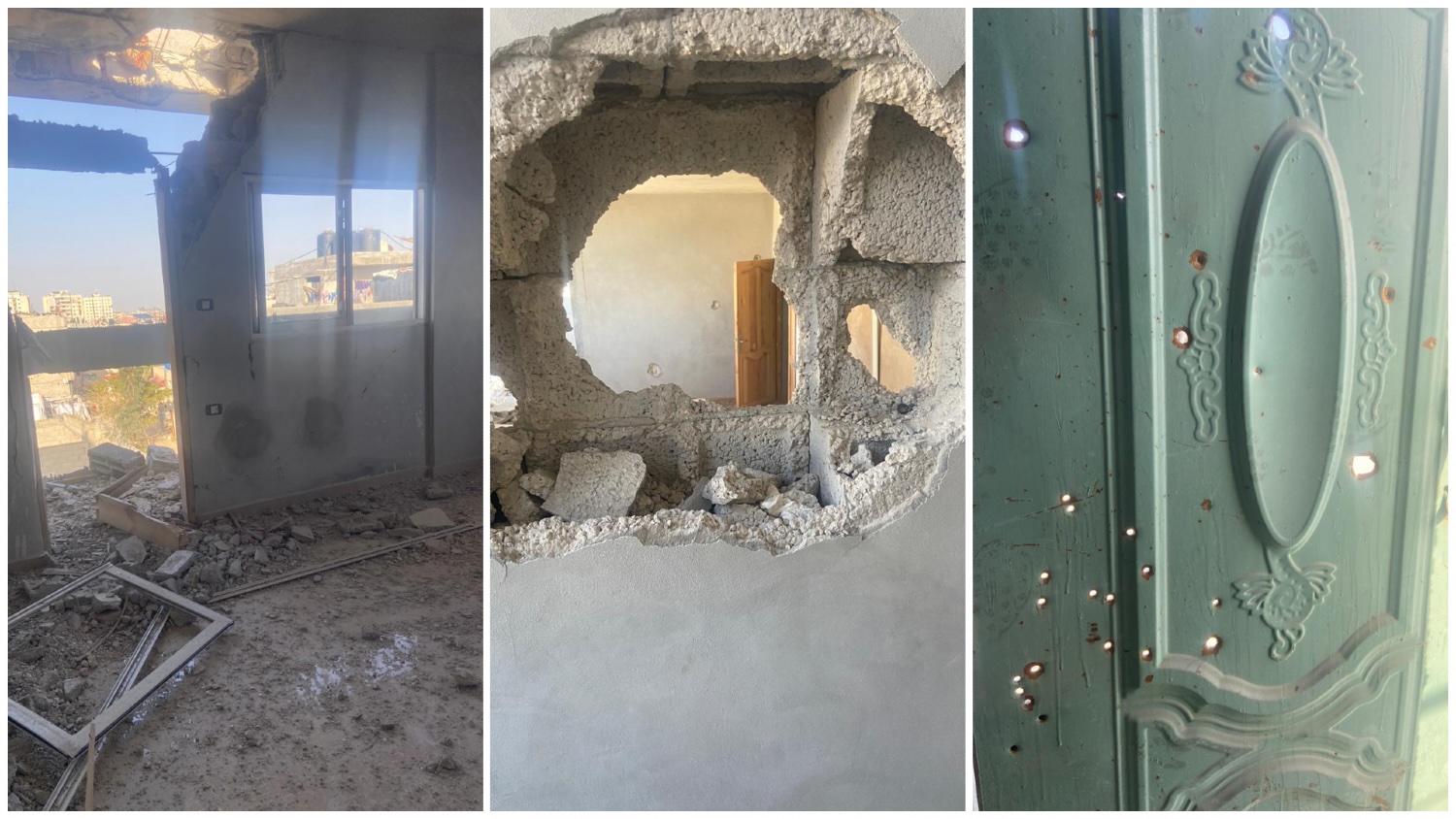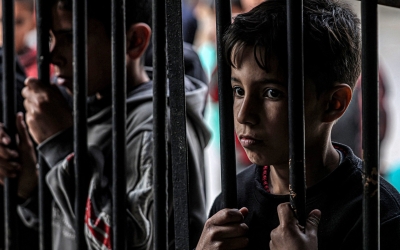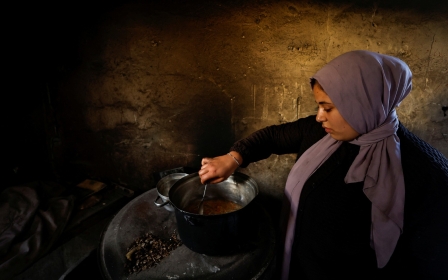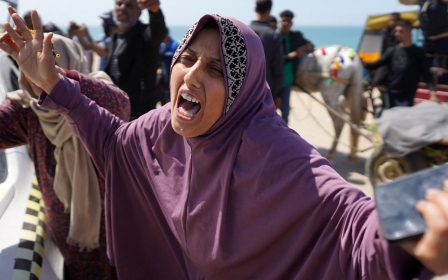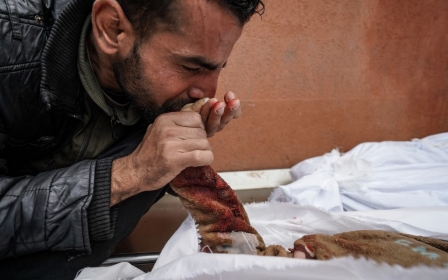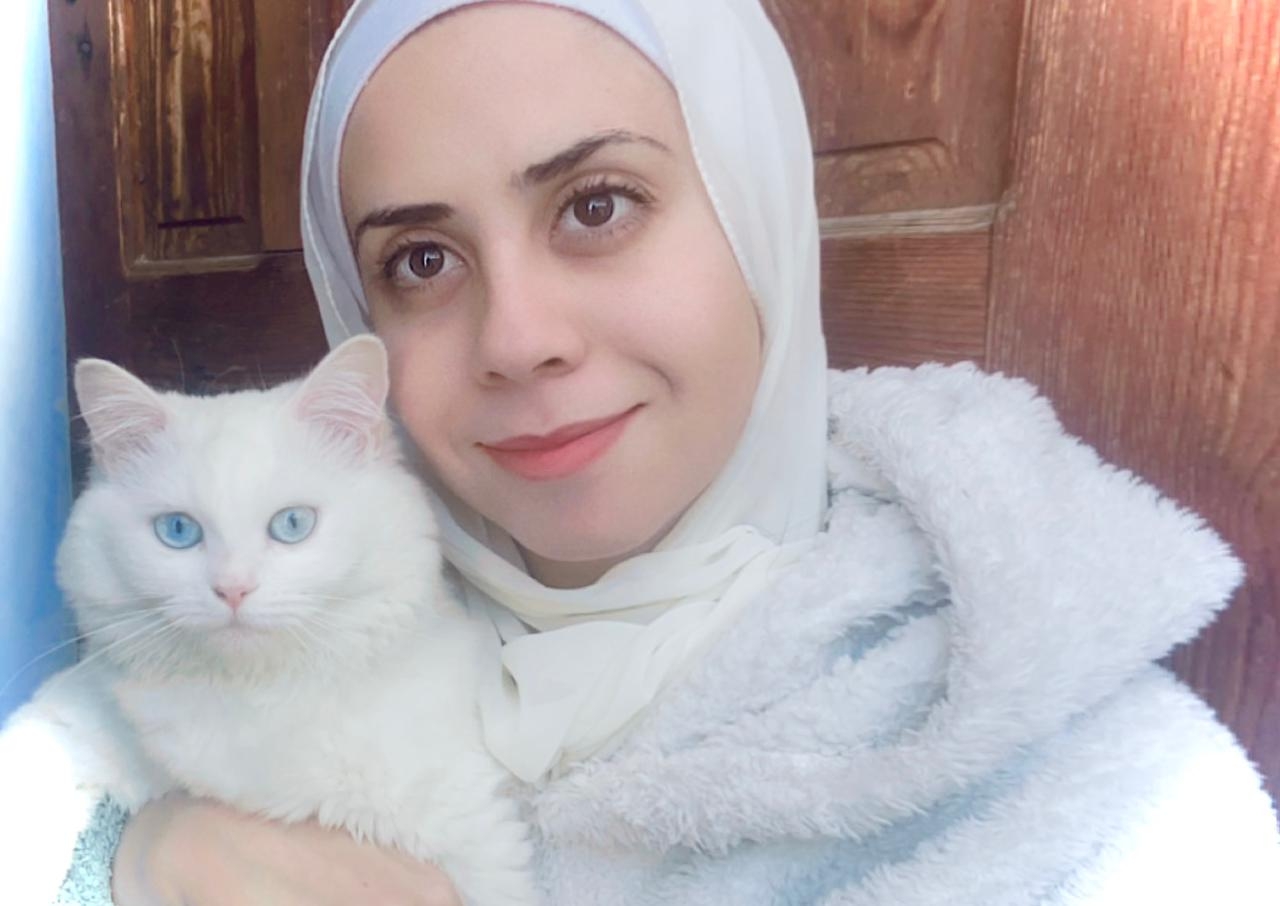
Gaza war diary: I'm shattered. My only comfort is my cat
It was that eerie time again. On 7 October, Israel declared another war on Gaza, grinding the entire region to a halt and forcing its population, which was no stranger to such attacks, into what had become a routine of survival.
Most of us had already lived through several military assaults in December 2008-January 2009; November 2012; July 2014; May 2021; and August 2022. Yet this latest war has shocked and nearly broken us.
It is louder, more vicious, and totally unrestrained. The horrors we've experienced over the last six months and witnessed in northern Gaza, in particular, are on an unprecedented level.
New MEE newsletter: Jerusalem Dispatch
Sign up to get the latest insights and analysis on Israel-Palestine, alongside Turkey Unpacked and other MEE newsletters
Since Israeli leaders declared us as "human animals" and waged war against all life in Gaza, I have been struggling to keep my humanity - even my sanity. Writing this diary is part of that effort.
'Rituals of war'
It was my day off - typically reserved for laundry - when I was jolted awake to the thundering sounds of missile strikes on the morning of Saturday, 7 October.
I wasn't waking up from a nightmare - I was waking up into one. And I still hadn’t done my laundry
My mother, who thought the noise was a sudden, severe storm, entered my room. She intended to collect the hanging laundry from the balcony to prevent it from getting wet. I quickly asked her to hold off and not open the balcony door just yet.
Just then, we heard my little niece, Mira, screaming outside. She was not an early bird and, in the morning, would often resist going to kindergarten by screaming and crying a bit. But this time, gripped by anxiety and distress, we rushed outside to bring little Mira back in.
One of my brothers soon returned with the grim news: a missile had struck our neighbourhood, killing a teacher and a high school girl on their way to school. At that moment, the harsh reality set in: war had once again engulfed Gaza.
I refused to believe it was war. I desperately hoped it wouldn't be war.
Follow Middle East Eye's live coverage of Israel's war on Gaza
In the first few days, waking up was very painful. I would be OK for just that millisecond, and then it would hit me like a tonne of bricks: I wasn't waking up from a nightmare - I was waking up into one. And I still hadn't done my laundry.
After a few days, we prepared our emergency bags, which included items like passports, IDs, and other important documents, and placed them by the door. It was a ritual born out of necessity as the dark clouds of war hung low over Gaza - a ritual that conveyed the unspoken and unsettling truth that running away from death was our only option.
Another war ritual was keeping a bottle of water within reach while sleeping, which offered a lifeline if one was trapped under rubble for days.
Rooms were also chosen with careful consideration, perhaps in the centre of the house or near the corners - an area that would better protect us from the relentless bombardment.
Sleeping side by side became another ritual, not only because families found comfort in each other's presence but also because of the grim, albeit pragmatic, understanding that in a shared room, survivors could be saved faster if everyone were in the same spot.
More tragic still is the now commonly expressed desire among huddling families to either all live or die together so that survivors wouldn't have to grieve their loved ones.
I often wished we had bomb shelters, but we could never build those. Israel's illegal, 17-year-long blockade prohibits the type of cement used for the construction of such bunkers from entering the Strip. There was no safe place for Palestinians in Gaza: you either get bombed or wait to be bombed.
As the days wore on, entire families and bloodlines were wiped from the civil registry. We developed a new ritual of placing handwritten notes inside our emergency bags, naming a relative to whom the bag should be given if, God forbid, none of us survived.
Fighting to survive
There are so many Palestinians in Gaza dying slowly, uncounted, and unseen.
The first time I had ever seen my eldest brother cry was in the early days of the war. Two of our beloved neighbours' houses were bombed. My brothers and a few other men in our neighbourhood desperately tried in vain to rescue the children.
My eldest brother was known to have the biggest and most beautiful eyes in our family, and we always teased him that none of his children got his big eyes. That day, when he returned home, he wept in grief - his big eyes turning into an ocean of tears that drowned our hearts with him.
On 14 October, we mourned the loss of my uncle, who died protecting his four-year-old son from shrapnel that hit their parked car following an air strike nearby. My uncle was found dead with his arms wrapped around his little boy, who survived with burns on his head.
The weight of this loss is immeasurable. My uncle did not just leave behind the memory of his infectious laughter but the responsibility of six young children for our grieving family to nurture and protect.
Since my family's home is located in central Gaza, we were used to having relatives, especially those living near the buffer zone, at our house each time Israel launched a military attack on Gaza.
Just a few miles away are the tanks separating Gaza City and north of Gaza on the two main roads, Salah al-Din and al-Rashid. We hear explosions day and night, and surrounding us are constant battles.
Almost immediately, our house became a shelter for over 45 relatives, including 13 children. On the third week of the war, it served as a rest area for internally displaced family members and friends journeying from the north to the south of Gaza, as ordered by the Israeli military.
Somewhere close by was the sound of constant shooting, but we had to remain strong for the grandchildren and relatives in our house
Somewhere close by was the sound of constant shooting, but we had to remain strong for the grandchildren and relatives in our house.
I loved hearing the children's laughter and footsteps moving up and down the stairs. It made me forget the sounds of explosions, F-16s patrolling, and drones hovering over our heads. The presence of the children helped me focus on the fact that I was still alive and should enjoy whatever time or privileges I had.
For brief moments, things almost felt "normal" until a loud explosion would stop everyone in their tracks. On one painful occasion, my baby cousin was riding in his toy car, going "vroom vroom", when out in the distance was a deafening boom. Frightened, he immediately ran into my arms, and I tried my best to calm him down.
As time passed, maintaining cleanliness and ensuring an adequate food supply became increasingly challenging. We had two goals: to survive and somehow avoid getting sick since it was impossible to access medicine. Unfortunately, it only took one child to fall ill for the other 12 children to follow suit. Two of my nephews had a bacterial infection in their stomachs due to the consumption of undrinkable water and exposure to different contaminants. A trip to the pharmacy became a treacherous journey and offered little help, as no suitable medications were available.
It was impossible to keep the children healthy at all times, given what little resources we now had.
Death moving closer
In the days that followed, it felt as though death had been moving closer and faster than ever before towards my family.
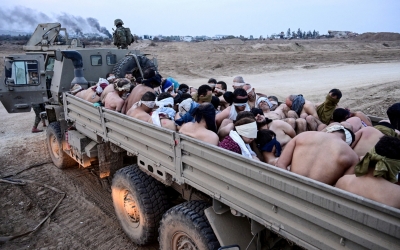
We lost another uncle, not to Israel's bombs but to a stroke in the middle of the night. Perhaps if telecommunication lines were functional, we could have called an ambulance and saved him. He, too, left behind a legacy of love and loss, with five young daughters now navigating their lives without their father's guiding hand.
While death tolls account for the victims of Israel's indiscriminate attacks, they often leave out the number of Palestinians dying a painful and slow death due to the lack of medical care, including cancer and kidney dialysis patients.
With every hospital targeted, bombed, and besieged, particularly al-Shifa hospital, health care is no longer accessible as the facilities are under the control of Israeli forces. Imagine what kind of slow suffering each patient has to go through on top of the bombings and devastation.
There is more and more grim news from the areas around us, which we read about online or hear about through word of mouth: the Israeli army published a map of residential areas with numbers for each block in the Gaza Strip.
The map was one of the most dystopian images that I have ever seen. We were marked for death. I was now hyper-stressed and I hadn't even figured out which numbered block was mine.
I kept thinking about the people without internet access who weren't warned and didn't receive any advance notice of evacuation or know where to go. I also thought of the vulnerable people who, by then, had already relocated three to six times - women, children, the elderly, and those with disabilities.
As a Palestinian, this felt like a systematic killing and displacement of more civilians. When will it stop? How many more children have to die?
I had just adopted Beasty one week before the war started, so she immediately became a survivor like us
I was struggling very hard to keep any hope or faith in humanity inside me alive. It is far past bleak. I don't know how Palestinians are ever going to have the freedom and dignity every human is told they deserve. How are these children meant to have any hope?
For weeks, Israel has been bombarding areas in southern Gaza where it told civilians to evacuate for safety, and schools, hospitals, and shelters have all been hit.
Communications are increasingly difficult, and the scale of bombardment has sewn chaos and terror among the population.
And now there is this map! I don't know if my loved ones and I will make it out alive, but I have to believe that such unjust and criminal policies cannot prevail.
We now plan our meals around whatever limited canned or basic food items are available in the market. My cat Beasty is also eating only once a day now, as her food supply is dangerously low.
She is doing remarkably well, braving the terror surrounding us. It won't be long before her food runs out, possibly in the next day or two, after which I will have to improvise a meal for her.
I had just adopted Beasty one week before the war started, so she immediately became a survivor like us. Whenever I approach her, Beasty immediately flips onto her back for me to rub her belly. It's like she can sense my mental state, always offering comfort and companionship when I need it most.
My sister and I joke about how Beasty will feed on us if we get bombed, and she survives. By now, we had been inundated with videos on social media showing starving cats and dogs feeding on the corpses in the streets of Gaza. My sister laughs, saying, "At least it would be our own cat feeding on us, not the other ones.
No safe zones
The new year had arrived, and a ceasefire was my one and only wish for 2024.
The decision to leave our home was agonising. Relatives sought refuge under our roof, but we could no longer offer them protection
Our days turned dreary, and the bombings increased in number and frequency. There was constant smoke and fire in the distance and increased reports of Israeli troops moving in closer and closer.
At 6am on 3 January, I was lying down on a mattress when I heard shelling from a tank, a constant sound since the beginning of the war. I then heard the haunting cries of a woman and the heartwrenching sobs of terrified children. I peered through the window, and the scene unfolding was straight from the depths of a nightmare.
Two neighbours, filling their water tanks using a pulley, were hit by five tank shells that rained down upon them, reducing their home to rubble. It felt as though the shelling was becoming louder and angrier as the constant stream overwhelmed the neighbourhood.
My brother and I stepped outside, witnessing the once-nice neighbourhood descend into utter chaos with the Israeli military intent on extinguishing all life.
Every neighbour was frantically attempting to flee, their faces conveying their shared desperation and disbelief. Is it possible to fit your house in a car and drive off? Probably not. But that's what I saw my neighbours doing: fitting as much as they could in cars, lorries or animal carts, and leaving.
The decision to leave our home was agonising. Relatives sought refuge under our roof, but we could no longer offer them protection and had no choice but to flee. My parents, three siblings, and I packed our emergency bags with some food and clothes, and Beasty and I headed to the Mawasi area in Khan Younis.
We later learnt that our area was surrounded for days by tens of Israeli military tanks and vehicles roaming the area. We were relieved by our decision to flee and to have remained alive, even if it was inside a tent.
On 18 January, I once again found myself fleeing after another fateful night - forever etched in my memory - of extensive shelling and confrontations in Khan Younis. We heard heavy combat: the exchange of gunfire, large calibre automatic weapons and artillery. It was non-stop. Large smoke plumes went on for miles. The smell of burning chemicals and gunpowder filled the air.
This time, I fled to my aunt's house in Rafah. The exhaustion from fleeing for a second time weighed heavily on my shoulders. Loading my belongings, a routine that had become all too familiar, demanded more than just physical strength - it required a resilience of spirit that felt increasingly elusive.
By the time I reached Rafah, I was completely burnt out. I had no more energy to live or carry out daily chores. The war had now invaded my dreams and subconscious, and my attempts to shrug it off were in vain. Rafah was immensely overcrowded, and the risk of infectious diseases lingered in the air.
Israel also began to threaten the civilian encampment with a ground invasion, inciting terror among families seeking shelter. Now, hundreds of thousands sit in their tents, anticipating a possible attack.
Deep inside, we knew that safe zones were fiction, and you had to just run to a potentially less deadly place. I couldn't process the fact that we might have to relocate again. Each step away from my home left a mark on my soul. The relentless cycle of fleeing and seeking refuge in the unknown was difficult to endure.
My brother and I decided to visit our house to check on whether it was safe enough to return. We embarked on a two-hour car ride to the middle area of Gaza. We arrived at our house, still standing but riddled with holes from bullets and shrapnel. The roof and upper floor had a huge gaping hole from a tank shell that tore through the house. Doors were broken from shrapnel everywhere, and water pipes were cut in half.
Those were the scars of war, and every house in our neighbourhood had them. We returned to Rafah thereafter.
No words
On 22 February, we lost several members of my cousin's family. Only two of his children survived. The older son, 23, was at a hospital volunteering as a nurse, while the other, who is just 15 years old, was in his house but miraculously survived the attack.
The teenager had to identify and bury the body parts of five family members whose bodies were blown out into the neighbouring houses. He, along with some relatives, collected the pieces of flesh scattered around in the neighbourhood.
There are still six other family members, including children, buried under the rubble of their home. I wonder if anyone can imagine the pain of these families that will never be whole again. Can any language or words ever encapsulate this pain? The pain of a child collecting shredded body parts of his own mother and father, or seeing his brother's body torn in half and his sister's body missing its limbs?
Even descriptions of bombs falling do not capture the scene, horror, chaos, and everything in between. It doesn't adequately convey the image of missing limbs; burning and mangled bodies; collected flesh; bodies cut in half; bodies without heads; bodies tangled in the air; and those blown out into the neighbourhood.
I write this knowing I can't look at children the same anymore. It is still hard to believe that children in Gaza are witnessing this kind of horror, with some surviving it physically but never mentally.
I'm fed up, frustrated and ashamed of the world we live in today.
I write knowing that it won't change anything, but I do so for the families torn apart by the bombs dropped. Their suffering must never be relegated to mere statistics or geopolitical calculus. Most importantly, I write to bear witness to our pain, honour our memories, and strive for a world where such atrocities are no longer tolerated or ignored.
I hate what this war has done to me. It has torn apart my soul, leaving me shattered and hopeless.
I never asked to learn the weight of a military tank, a monstrous 65 tonnes, but now it haunts my nightmares, reminding me of a picture of a Palestinian man in Gaza who was bulldozed over, inch by inch, with his guts spilling out, wrists still in zip-ties.
I never wanted to know that the limit of human endurance without food is up to three weeks, yet I had to search for how long a human can survive without food after seeing children's bodies wasting away while the world watches in indifference.
Lost forever
It's not over yet. I am fighting to stay alive until the next day, every day.
It is painful to share my emotions, but keeping a diary makes it easier for me to write and process these experiences and feelings, including the fear that runs through me.
The question is: how can we ever live normally again?
I sit awake in the late hours, restless, writing these words in the dark of the night to a soundtrack of engines, drones, and explosions - a cacophony of violent aggression
In six months, we've experienced the highest number of paediatric amputees, the fastest-growing hunger crisis, particularly among children, and the unprecedented targeting and killing of aid workers and journalists - and their families.
Israeli forces have systematically blown up every university and hospital in Gaza, more than 200 schools, and have boasted about the mass killing and starvation of children.
They have sexually violated and taunted Palestinian women and shared their war crimes on TikTok - all of which have been disproportionate, indiscriminate, and genocidal.
All day, every day, over the last six months, I have gotten lost in the news shuffle. In every area in Gaza that the Israeli military has invaded, the same emotional rollercoaster plays out: revulsion at the horrors and devastation the soldiers left behind.
I'm constantly frazzled by how much this senseless killing is accepted. How is everyone moving on? I wake up tired, and I sleep tired. Is Gaza lost forever? We will probably never recover from the emotional toll of this war.
My sister and I sit side by side, both with heavy hearts and weary eyes, reflecting on the toll of this prolonged war on Gaza, feeling exhausted and desperate.
"I can't remember the last time I felt truly at peace," my sister confessed, her voice laden with fatigue. "Neither can I," I murmured, reminiscing about simpler times and the blissful escape I used to find in sleep.
Whenever I had any problem or chaos in my life, I would sleep deeply and for long hours and then wake up feeling recharged to solve the issue and continue on with my life.
I haven't been able to sleep quietly or deeply for the last six months. If it is not the sounds of relentless bombings and drones, it is my anxiety and overthinking about the war.
My sister recounted how she used to find solace in the warmth of a hot bath, emerging renewed and resilient after an hour of quiet immersion. But now, this refuge has been stripped away by the unfathomable cruelties of this war and the scarcity of water.
We then somehow laughed about being robbed of these two simple comforts. We're both tired, our bodies exhausted, but our hearts are still filled with hope and determination.
I sit awake in the late hours, restless, writing these words in the dark of the night to a soundtrack of engines, drones, and explosions - a cacophony of violent aggression.
I continue to remind myself that it's not over yet. I don't know if I will live long enough to read these words again and reflect on them, but I continue to write what I am feeling. I still have faith. I still have hope.
I hope we survive this. I hope the beautiful, peaceful, happy world I once knew will come back after we are able to heal. I want to listen to music again, to laugh, to love, to be able to not think of the horror and chaos we are living through right now.
Will we ever survive or fully recover?
Middle East Eye delivers independent and unrivalled coverage and analysis of the Middle East, North Africa and beyond. To learn more about republishing this content and the associated fees, please fill out this form. More about MEE can be found here.


